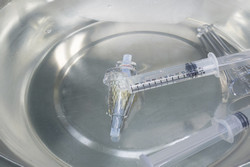Growing artificial heart valves
Valve replacement is the most common surgical procedure, accounting for almost 250 000 annual implantations worldwide. However, one third of these patients suffer from prosthesis-associated problems within 10 years. Existing valves, whether mechanical or bioprosthetic, suffer from limited viability and an inability to grow or repair. This is of particular concern for the efficient treatment of newborn babies with congenital heart defects. Scientists on the EU-funded LIFEVALVE(opens in new window) (Living autologous heart valves for minimally invasive implantable procedures) project combined tissue engineering and minimally invasive implantation technology to generate improved heart valves. The aim was to develop a tissue-engineered heart valve with repair and regeneration capacity that minimises the need for future surgical intervention. The LIFEVALVE partners undertook extensive biomaterial characterisation and optimisation procedures to produce a valve based on decellularisation technology. This entailed seeding the cells on a scaffold and culturing them in a bioreactor system to form tissue that finally takes over the function of the initial scaffold. Scientists tested various foetal and adult stem cells for their capacity to differentiate into cardiac tissue. All living cells were finally removed and the valve showed good performance following in vivo implantation in sheep. A biodegradable, self-expanding stent accompanied the implantation of the tissue-engineered valve. The chosen material was the biocompatible poly L-lactic acid and the implantation procedure was minimally invasive. Using a specific delivery system, project scientists ensured a safe trans-catheter-based delivery. The deliverables of the LIFEVALVE study constitute significant medical progress in the field of heart surgery and prosthetics. Although clinical testing is pending, the novel approach is expected to improve the lives of patients undergoing heart valve replacement and reduce associated healthcare costs.







